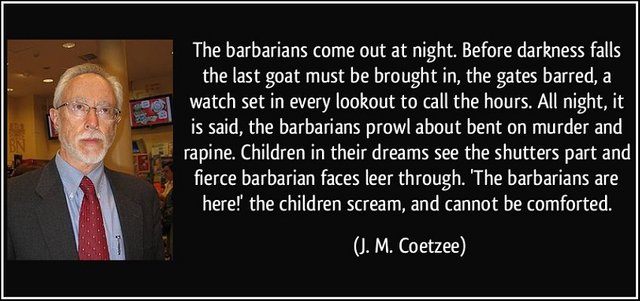[BOOK REVIEW] Waiting for the Barbarians (1980) by John Coetzee 📚
"Waiting for the Barbarians" came out in 1980 and is widely regarded as Coetzee's breakthrough as a writer. The very title reveals the novel's allegorical perspective. "Waiting for the Barbarians" is the title of a poem by the Greek poet Konstantinos Kavafis, in which the approaching barbarians first a presented as the downfall of civilization and then, when they aren't coming, as something that gave life meaning for those who were waiting for their extinction.

In Coetzee's novel, we find ourselves in an outpost in a fictional colony without name. The protagonist and narrator is a magistrate who harbors a benevolent interest in the so-called barbarians, an indigenous people who live for themselves in the wilderness where they may prepare a rebellion. On the outskirts of the empire, on the very edge of the desert, the last outpost of "civilization", the magistrate is placed to maintain law and order. Triggered by a case of livestock theft, suddenly one day the security police arrives and a merciless and indiscriminate hunt for suspected sympathizers of the "barbarians" begins. The magistrate is caught in a nightmarish political situation and is forced to choose sides. He chooses to draw his sword, not literally and without any plans or higher idealistic goals and with little benefit. A move which in itself becomes destructive and almost cost him his life. What remains is alienation and meaninglessness.
When the lone protagonist who gradually loses everything, has reached a state where he's humiliated and without rights, no longer a citizen, he also has much in common with the animals for which Coetzee's compassion is noticeably strong. There's no real heroism in Coetzee's books - it's rather about the retreat of the main character, from humanity to being reduced to the purely biological.
The magistrate is a liberal humanist of the old school, but slowly he's forced to realize that a new era has dawned, represented by Colonel Joll and his ilk. To force the barbarians into submission they don't shy away from any form of violence or cruelty. The magistrate, who's been seized by an almost unbearable sense of guilt, takes care of a barbarian girl who was raped and tortured by the military, and she becomes his mistress. This girl is one of the few female characters in the novel, apart from a prostitute that he visits. The magistrate unconsciously views the woman as a means for his pointless revolt against the system. He quite literally lies with the enemy. His vague aversion towards the empire which he represents as an officer is described already from the start, and he experience a moment of wild liberation when he's imprisoned. He's the man who finally said no. And immediately after that, he seems to have forgotten the woman.
Already in the first sentence of "Waiting for the Barbarians" the dark and impenetrable glasses of the sadistic Colonel Joll are described. And to see or not (want to) see, to see too much or too little, becomes a central metaphor in the story - rarely have I read a novel with so many blind and semi-blind people (and even animals).
Even though it's incessantly engaged in the crucial issue of theology, the nature of evil, "Waiting for the Barbarians" is clinically free of religious elements. It's as if Coetzee wanted to strip away everything inessential: historical and geographical positions, philosophical and religious traditions, to instead focus solely on man's constant wrestling with suffering. With painful realism the novel describes the most horrific atrocities and discusses the driving forces behind both the power-drunk violence, as well as humanism. There are clear parallels between this novel and Joseph Conrad's Heart of Darkness (1902) in the portrayal of the psychology of violence.

The intentions of this real barbarism are shrouded in mystery. When asked why all this effort is spent on a trivial case of theft, the colonel answers: "I have a commission to fulfil, Magistrate. Only I can judge when my work is completed." The motives behind all the evil will not be clarified any further. The language is taut, straightforward and precise, it offers no surprises but never betrays its reader.
The consistent distinction in Coetzee's depiction of the war between the nomadic barbarians and the Empire's forces also brings to mind both Deleuze and Le Clezio. The desert becomes a symbolically charged place, and stands for both freedom and impending danger, the unknown sphere that is outside of the organized society. At the same time it must be noted that the distinction between the Empire and the nomads is a bit simplified. In reality, many nomadic tribes have committed some of the most horrific atrocities against their own and their neighbors.
The title of the book is also ambiguous. It's never clear what the Barbarians will bring when the waiting is over: erasure or something new and better? Even though it's complex and ambiguous, and raises more questions than it provides answers and options, Coetzee has managed to deliver a dark and powerful work.
It's obvious that "Waiting for the Barbarians" can be read as a political allegory about the situation in South Africa during the apartheid days, but it's first and foremost a universally valid novel about the mechanisms of evil. Together with "Disgrace" (1999), this is essential reading from South African Nobel Laureate John Coetzee.
— SteemSwede
Thank you for the review SteemSwede. I already read some of Coetzee's work and you got me interested for this book too. If I only didn't have 90-something books on my huge pile of to-read books, I would grab this one right away! One day hopefully I get to it too. 😊
Glad it got you interested! :)
Oow yes, you succeeded it! 😆
This post has been ranked within the top 80 most undervalued posts in the second half of Dec 06. We estimate that this post is undervalued by $7.64 as compared to a scenario in which every voter had an equal say.
See the full rankings and details in The Daily Tribune: Dec 06 - Part II. You can also read about some of our methodology, data analysis and technical details in our initial post.
If you are the author and would prefer not to receive these comments, simply reply "Stop" to this comment.